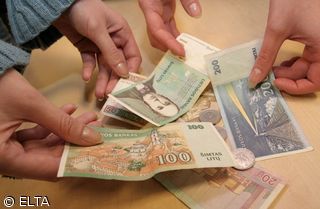The pensions question needs to be resolved between Poland and Eurostat and at some point there will be some form of agreement
Published:
19 October 2004 y., Tuesday
The pensions question needs to be resolved between Poland and Eurostat and at some point there will be some form of agreement.
MichaŠŠ DybuŠŠa, chief economist with BNP Paribas:
"The pensions question needs to be resolved between Poland and Eurostat and at some point there will be some form of agreement. The final exchange rate for the Euro will need to be found and calculations would indicate that a rate could be 4.20 zŠŠoty or even slightly less at 4.10.
"If you look at Poland and the rest of the Central European countries, they are much closer to convergence in terms of business structures than, say, Portugal, Greece and Ireland were, and that will allow them to withstand the asymmetrical shock of convergence.
"Secondly, the Euro zone offers the benefit of taking advantage of lower interest rates. In the Euro zone they have a base rate of 2 percent and in Poland interest rates are 6.5 percent. This is a tremendous difference and will be greatly appreciated by businesses. So from these points of view we can say the quicker the better in terms of joining the Euro zone.
"In terms of entry, Slovenia is particularly well placed, but if you look at the four Central and Eastern European countries-Hungary, Czech Republic, Slovakia and Poland-we are well placed because not all the other countries have such good economic track records.
"Opposition might come from old EU countries like France and Germany, which are suffering at the moment and might say taxes are too low and that Poland will offer unfair competition. This is the political dimension, and if France and Germany do not feel very secure it could prove a difficulty. One can imagine that Poland's fiscal policy and figures will not only be scrutinized in Brussels but will be examined in great detail in the likes of Paris and London. I can't talk for the political sector but the business sector is prepared to weather this and that indicates the strength of Poland in these areas.
"The only area where I can see a detrimental effect is the death of the Polish markets. That will mean there is no more work for people like me and we will have to find other work. Putting that aside, there seems to be a certain amount of optimism when you consider membership in the Euro zone."
Šaltinis:
wbj.pl
Copying, publishing, announcing any information from the News.lt portal without written permission of News.lt editorial office is prohibited.
The most popular articles
 According to the data presented by the Ministry of Finance, in end-January central government debt made up LTL26, 310.8 million or 28% of projected GDP for 2010 (LTL 93, 819 million).
more »
According to the data presented by the Ministry of Finance, in end-January central government debt made up LTL26, 310.8 million or 28% of projected GDP for 2010 (LTL 93, 819 million).
more »
 As far as countries affected by the economic crisis, China fared extremely well.
more »
As far as countries affected by the economic crisis, China fared extremely well.
more »
 The European Commission has authorised today a Slovak scheme with a budget of approximately €3.32 million which aims at supporting farmers in Slovakia who encounter difficulties as a result of the current economic crisis.
more »
The European Commission has authorised today a Slovak scheme with a budget of approximately €3.32 million which aims at supporting farmers in Slovakia who encounter difficulties as a result of the current economic crisis.
more »
 Commission sets out a 10-year strategy for reviving the European economy, casting a vision of ‘smart, sustainable, inclusive' growth rooted in greater coordination of national and European policy.
more »
Commission sets out a 10-year strategy for reviving the European economy, casting a vision of ‘smart, sustainable, inclusive' growth rooted in greater coordination of national and European policy.
more »
 The European Commission has launched today the Europe 2020 Strategy to go out of the crisis and prepare EU economy for the next decade. The Commission identifies three key drivers for growth, to be implemented through concrete actions at EU and national levels.
more »
The European Commission has launched today the Europe 2020 Strategy to go out of the crisis and prepare EU economy for the next decade. The Commission identifies three key drivers for growth, to be implemented through concrete actions at EU and national levels.
more »
 Launching of the “SCHOOLS’ initiative for innovation and changes” Grant scheme.
more »
Launching of the “SCHOOLS’ initiative for innovation and changes” Grant scheme.
more »
 EU Member States must not only deliver on their international aid pledges, but also bring in a financial transactions tax and a temporary debt moratorium, to help developing countries to cope with the effects of the global financial and economic crisis, said the Development Committee on Monday.
more »
EU Member States must not only deliver on their international aid pledges, but also bring in a financial transactions tax and a temporary debt moratorium, to help developing countries to cope with the effects of the global financial and economic crisis, said the Development Committee on Monday.
more »
 The EBRD is increasing its commitments to promote sustainable energy projects in Slovakia with a new €90 million funding under the existing Slovakia Sustainable Energy Finance Facility (SLOVSEFF) to ensure continuous implementation of energy efficiency and small renewable energy projects.
more »
The EBRD is increasing its commitments to promote sustainable energy projects in Slovakia with a new €90 million funding under the existing Slovakia Sustainable Energy Finance Facility (SLOVSEFF) to ensure continuous implementation of energy efficiency and small renewable energy projects.
more »
 According to the unaudited data, in 2009 AB Bank SNORAS earned LTL 8.7 million profit. The bank’s assets grew by 11 per cent up to LTL 6.342 billion during 2009 and were by LTL 647.8 million larger than at the beginning of 2009.
more »
According to the unaudited data, in 2009 AB Bank SNORAS earned LTL 8.7 million profit. The bank’s assets grew by 11 per cent up to LTL 6.342 billion during 2009 and were by LTL 647.8 million larger than at the beginning of 2009.
more »
 Aviation security measures that go beyond common EU requirements should be paid for by Member States, not by passengers, said Transport Committee MEPs in a vote on Monday that could put Parliament on a collision course with the Council of Ministers.
more »
Aviation security measures that go beyond common EU requirements should be paid for by Member States, not by passengers, said Transport Committee MEPs in a vote on Monday that could put Parliament on a collision course with the Council of Ministers.
more »